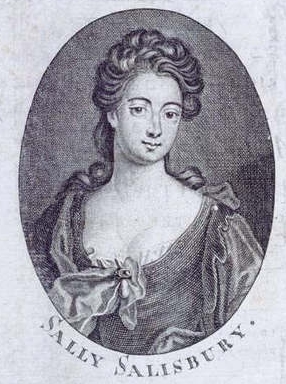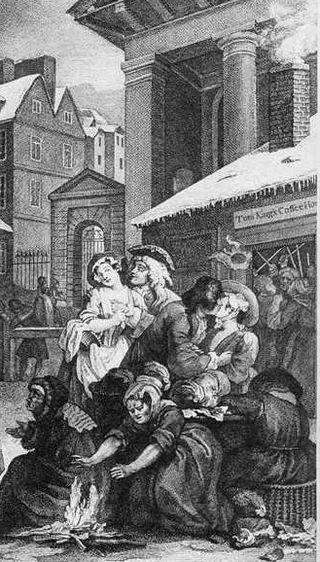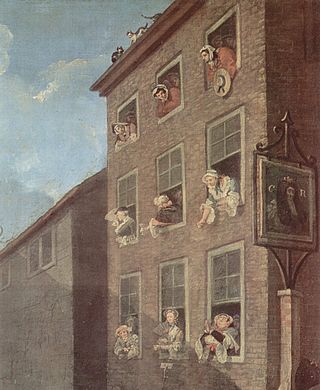
A brothel, bordello, ranch, or whorehouse is a place where people engage in sexual activity with prostitutes. However, for legal or cultural reasons, establishments often describe themselves as massage parlors, bars, strip clubs, body rub parlours, studios, or by some other description. Sex work in a brothel is considered safer than street prostitution.
Cynthia Diane Payne was an English brothel keeper and party hostess who made headlines in the 1970s and 1980s, when she was convicted of running a brothel at 32 Ambleside Avenue, in Streatham, a suburb in south London.

Maggie Hall was a prostitute and brothel madam in the early history of Murray, Idaho, originally from Dublin, Ireland. In local lore she is known as a "Prostitute with a heart of gold" and the "Patron Saint of Murray".

Henrietta Howard was a mistress of King George II of Great Britain and the sister of John Hobart, 1st Earl of Buckinghamshire.

Sarah Pridden, commonly known as Sally Salisbury, was a celebrated prostitute in early 18th-century London. She was the lover of many notable members of society, and socialised with many others.

Tom King's Coffee House was a notorious establishment in Covent Garden, London in the mid-18th century. Open from the time the taverns shut until dawn, it was ostensibly a coffee house, but in reality served as a meeting place for prostitutes and their customers. By refusing to provide beds, the Kings ensured that they never risked charges of brothel-keeping, but the venue was nevertheless a rowdy drinking den and a favourite target for the moral reformers of the day.

Jane Douglas, commonly known as Mother Douglas, was a brothel-keeper in mid-18th century London. Known at the time as "The Empress of the Bawds", her house in Covent Garden attracted customers from the higher echelons of society.
Fernande Grudet, also known as Madame Claude, was a French brothel keeper. In the 1960s, she was the head of a French network of call girls who worked especially for dignitaries and civil servants.

Elizabeth Needham, also known as Mother Needham, was an English procuress and brothel-keeper of 18th-century London, who has been identified as the bawd greeting Moll Hackabout in the first plate of William Hogarth's series of satirical etchings, A Harlot's Progress. Although Needham was notorious in London at the time, little is recorded of her life, and no genuine portraits of her survive. Her house was the most exclusive in London and her customers came from the highest strata of fashionable society, but she eventually ran afoul of the moral reformers of the day and died as a result of the severe treatment she received after being sentenced to stand in the pillory.

The Covent-Garden Tragedy is a play by Henry Fielding that first appeared on 1 June 1732 at the Theatre Royal, Drury Lane alongside The Old Debauchees. It is about a love triangle in a brothel involving two prostitutes. While they are portrayed satirically, they are imbued with sympathy as their relationship develops.

The 1668 Bawdy House Riots took place in 17th-century London over several days in March during Easter Week, 1668. They were sparked by Dissenters who resented the King's proclamation against conventicles while turning a blind eye to the equally illegal brothels. Thousands of young men besieged and demolished brothels throughout the East End, assaulting the prostitutes and looting the properties. As the historian Tim Harris describes it:
"The riots broke out on Easter Monday, 23 March 1668, when a group attacked bawdy houses in Poplar. The next day crowds of about 500 pulled down similar establishments in Moorfields, East Smithfield, St Leonard's, Shoreditch, and also St Andrew's, Holborn, the main bawdy house districts of London. The final assaults came on Wednesday, mainly in the Moorfields area, one report claiming there were now 40,000 rioters - surely an exaggeration, but indicating that abnormally large numbers of people were involved. ... On all days the crowds were supposedly armed with 'iron bars, polaxes, long staves, and other weapons', presumably the sort of tools necessary for house demolition. The rioters organized themselves into regiments, headed by a captain, and marching behind colours."
Damaris Page also known as Damarose Page, was a London brothel keeper, entrepreneur and property developer, one of the most successful and famous prostitutes of her time.

Elizabeth Cresswell, also known as Mother Creswell and Madam Cresswell of Clerkenwell, was one of the most successful prostitutes and brothel keepers of the English seventeenth century. Starting with houses in Bartholomew Close, in the City of London and St Leonard's, Shoreditch, she built a widespread network of brothels across London, supplied with girls and women from across England. Her employees included the wives of soldiers pressed into service for Charles II and gentlewomen who had supported the Cavalier cause during the English Civil War and had since fallen on hard times. Her bawdy houses were favoured by King Charles and his court as well as powerful figures in government and city guilds. This position gave her a measure of immunity from prosecution and added to her profile as a caricature of iniquity and corruption.

Madame Therese, also known as Madame Traese, was the professional name of a famous Dutch brothel keeper. She operated one of the largest and most famous brothels of her time in Amsterdam, with a reputed international list of powerful clients, and was often caricatured in the press. She is confirmed as active from 1706 until 1729.

Marguerite Gourdan, née Marguerite Alexandrine Ernestine Stock was a French brothel owner and procurer in 18th-century Paris. Her brothel was the most exclusive in Paris during that age, and Gourdan was arguably the most famous of her profession.

The Whores' Petition was a satirical letter addressed from brothel owners and prostitutes affected by the Bawdy House Riots of 1668, to Lady Castlemaine, lover of King Charles II of England. It requested that she come to the aid of her "sisters" and pay for the rebuilding of their property and livelihoods. Addressed from madams such as Damaris Page and Elizabeth Cresswell, it sought to mock the perceived extravagance and licentiousness of Castlemaine and the royal court.

Justine Paris, real name Bienfait, was a French courtesan and madam. She hosted several of the most famous brothels in mid-18th-century Paris and was one of the most known and successful of her trade. She and her brothel are portrayed in the memoirs of Casanova. She has been suggested to be the role model for the title character in Juliette by the Marquis de Sade.
![<span class="mw-page-title-main">Peg Plunkett</span> Leeson [née Plunkett], Margaret (1727–1797), courtesan and writer](https://upload.wikimedia.org/wikipedia/commons/thumb/3/31/Miss_Peg_Plunkett_1727_1797.jpg/320px-Miss_Peg_Plunkett_1727_1797.jpg)
Peg Plunkett (1727–1797) was an Irish brothel keeper in Dublin who wrote her memoirs in three volumes.

Priss Fotheringham, was an English sex worker and madam from London who was described in a number of publications from the 1660s. One publication, The Wandering Whore, described her as the 'second best whore in the city'. An unofficial blue plaque commemorating her was installed in 2012 at the corner of Whitecross Street and Old Street in East London, but was reported in January 2023 to have "recently been obscured by a new artwork".















![<span class="mw-page-title-main">Peg Plunkett</span> Leeson [née Plunkett], Margaret (1727–1797), courtesan and writer](https://upload.wikimedia.org/wikipedia/commons/thumb/3/31/Miss_Peg_Plunkett_1727_1797.jpg/320px-Miss_Peg_Plunkett_1727_1797.jpg)
